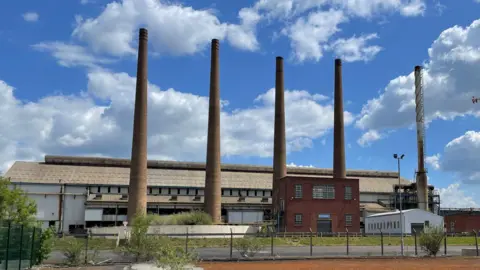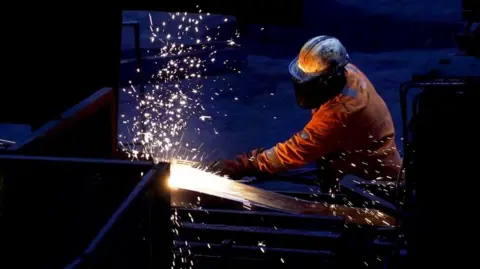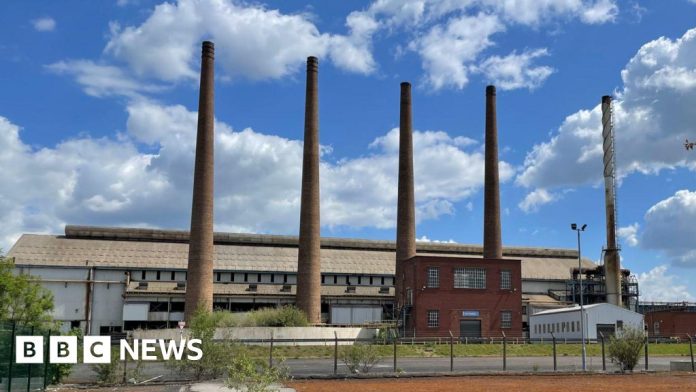Business editor, BBC News
 BBC/Spencer Stokes
BBC/Spencer StokesThe UK’s third-largest steelworks has been placed under government control, creating an uncertain future for nearly 1,500 workers in Rotherham and Sheffield.
Insolvency courts granted a compulsory winding up order sought by creditors owed hundreds of millions of pounds by Speciality Steels UK (SSUK) – part of the Liberty Steel metals empire of controversial tycoon Sanjeev Gupta.
The company, which uses scrap metal to manufacture steel, will now be placed in the hands of the official receiver – a government appointed liquidator – and special managers from consultancy firm Teneo.
The government has agreed to cover the ongoing wages and costs of the plant while a buyer for is sought.
Following the High Court decision, Liberty Steel’s chief transformation officer Jeffrey Kabel told the BBC he was “really disappointed” as he thought they had “presented a very good case”.
“We are by far the best company to run this business. We’ve run it for 10 years. Put a lot of blood, sweat and a huge amount of money into it,” he said.
In a separate statement, Mr Kabel said the move would “impose prolonged uncertainty and significant costs on UK taxpayers for settlements and related expenses, despite the availability of a commercial solution”.
Lawyers for Mr Gupta had applied for a four-week adjournment for time to place the company in a “pre-pack administration”, which allows an insolvent company to sell its assets to a bidder.
He wanted funding from investment giant BlackRock and Fidera, which invests in distressed companies, to buy back the business.
Winding up the company, his lawyers argued, could place the business in “free fall” and incur significant disruption, cost and risk to a nationally important steel company and its 1,500 workers.
The judge found the company was “hopelessly insolvent” with £600,000 in the bank, a monthly wage bill of £3.7m, supported by a parent group that has 15 entities in insolvency proceedings across nine jurisdictions.
 PA Media
PA MediaOne of the creditors, Ryan Perkins for Greensill Capital, argued UK steel-making would be better served if the company’s assets were sold off with assistance from independent special managers acting on behalf of the government after it is wound up, rather than allowing administrators appointed by Mr Gupta to conduct the process.
In a separate court hearing on Wednesday, Mr Perkins presented a letter from the Department for Business and Trade showing approaches made by third parties.
The court heard they had “expressed an interest in returning some or all of the sites to steel-making”, which was the “government’s desire”.
The letter added “an orderly compulsory liquidation may be one way of ensuring steel production restarts”.
Liberty Steel Group’s finances were upended when its main lender, Greensill Capital, collapsed owing billions to investors including UBS and Citibank. Those investors are part of the creditor group that applied for the winding up petition.
Mr Gupta’s plan to place SSUK in administration then immediately buy it out again would have allowed the company to largely shed those debts.
Mr Kabel said the company was still hopeful it could buy SSUK back due to “Blackrock, supporting us, and several others”.
In court, creditors highlighted how SSUK had not published financial statements since 2019 and its direct parent company, based in Singapore, was itself subject to insolvency proceedings.
The government will now be responsible for the operational and financial risks of the company, which has produced next to no steel for over a year.
The court decision comes after the government took over day to day running of British Steel’s Scunthorpe plant in April to prevent its Chinese owners from closing its steel furnaces.
The entire industry has struggled with high energy prices, cheaper products from overseas and the blow to exports to the US caused by 25% tariffs imposed by the Trump administration.
Following the High Court decision on Thursday, the GMB union said it was “another tragedy for UK steel”.
‘We just want to start producing steel again’
 Chris Williamson
Chris WilliamsonChris Williamson has worked at the Rotherham site for more than 25 years and is a union rep for Community union.
He told the BBC special managers appointed to run the business have already arrived on site.
“We’ve not been told anything so far. It’s all a bit up in the air, and we’ll need to see some detail”, he said.
He said the court’s decision “puts a closure on things” but workers wanted “guarantees on pay and pensions”.
Mr Williamson said the Rotherham plant had not produced steel since July 2024, with most of the workers on a form of furlough, being paid 85% of their wages.
“We just want certainty and to start producing steel again”, he said.
With additional reporting from Pritti Mistry and Ollie Smith


